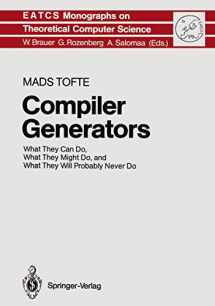
Compiler Generators: What They Can Do, What They Might Do, and What They Will Probably Never Do (Monographs in Theoretical Computer Science. An EATCS Series, 19)
ISBN-13:
9783642648571
ISBN-10:
3642648576
Edition:
Softcover reprint of the original 1st ed. 1990
Author:
Mads Tofte
Publication date:
2011
Publisher:
Springer
Format:
Paperback
158 pages
FREE US shipping
Book details
ISBN-13:
9783642648571
ISBN-10:
3642648576
Edition:
Softcover reprint of the original 1st ed. 1990
Author:
Mads Tofte
Publication date:
2011
Publisher:
Springer
Format:
Paperback
158 pages
Summary
Compiler Generators: What They Can Do, What They Might Do, and What They Will Probably Never Do (Monographs in Theoretical Computer Science. An EATCS Series, 19) (ISBN-13: 9783642648571 and ISBN-10: 3642648576), written by authors
Mads Tofte, was published by Springer in 2011.
With an overall rating of 4.4 stars, it's a notable title among other
books. You can easily purchase or rent Compiler Generators: What They Can Do, What They Might Do, and What They Will Probably Never Do (Monographs in Theoretical Computer Science. An EATCS Series, 19) (Paperback) from BooksRun,
along with many other new and used
books
and textbooks.
And, if you're looking to sell your copy, our current buyback offer is $0.58.
Description
The OrIgIn of this monograph is a course entitled "Semantics directed Compiler Generation" which Professor Neil D. Jones gave in 1982 at Copenhagen University, where I was a student at the time. In this course, he described a compiler generator, called CERES, which he was developing. I immediately felt attracted to the unusual combination of mathematical reasoning about com pilers and the small intricate building blocks that made up the running system. As I came to understand the system I discovered that within the existing mathematical framework one could express compiler generation as a special case of compilation; this led to a specification of a compiler generator which was bootstrapped on itself resulting in a machine-generated compiler generator. The purpose of this monograph is to describe the CERES system we produced in 1983-84 and compare it with other systems, includ ing more recent ones. Also, it is as relevant today as it was then to discuss the role of compiler generators as an aid in the design and implementation of programming languages; this I do in Chap. 5. This monograph is a strongly revised version of the cando scient.


We would LOVE it if you could help us and other readers by reviewing the book
Book review

Congratulations! We have received your book review.
{user}
{createdAt}
by {truncated_author}


